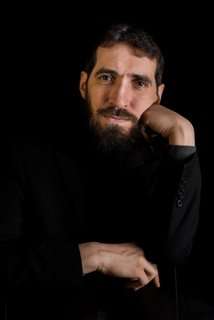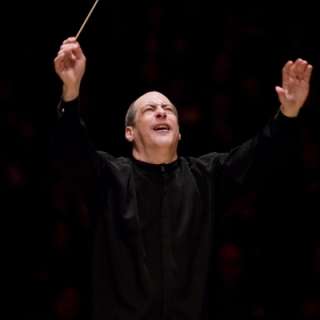|
Back
The God Factor New York
Issac Stern Auditorium, Carnegie Hall
04/30/2016 - & April 14, 16 (Atlanta), 27 (Athens, GA), 2016
Robert Shaw 100th Birthday Celebration: Jonathan Leshnoff: Zohar (NY Premiere)
Johannes Brahms: Ein deutsches Requiem, Opus 45
Jessica Rivera (Soprano), Nmon Ford (Baritone)
Atlanta Symphony Orchestra Chorus, Norman Mackenzie (Director), Atlanta Symphony Orchestra, Robert Spano (Music Director and Conductor)

J. Leshnoff (© Erica Abbey Photography)
“Aleph, beis, gimmel, daled, hey, vav…These are the twenty-two letters. And with them, G-D created His universe.”
From the “Sefer Yetzirah”, translated by Jonathan Leshnoff
Composer/translator Jonathan Leshnoff chose some awe-inspiring texts for his choral/orchestral work Zohar, given its New York premiere last night. In fact, the Medieval words quoted above are semiotically analogous to today’s most scientific theories about the creation of the universe. Mr. Leshnoff’s choice of a Robert Benedek version of another Zohar story, about a shepherd boy beloved of God, and another poem extolling the superlatives of the Eternal One are equally beautiful.
To this, however, Mr. Leshnoff provided music which was, to say the least, underwhelming Not underwhelming in volume, for he could turn up the loudness whenever necessary. Yet Mr. Leshnoff’s musical language were, first of all, simply not of this century. And his sentiments to the words were more punctuation and underlining than interpretation or augmentation.
The composer is extremely prodigious, having written for artists like Gil Shaham, and given this co-commission by Carnegie Hall and the Atlanta Symphony. Yet from the first measures–a shofar-like announcement, strings shoveling wildly, and a choral proclamation, I felt nothing even approaching either the unconscious (of his or our minds) or subtlety or even the slightest hint that the heavenly words he had discovered from the mystical thoughts of the great rabbinical tradition could be glorified with his notes.
Was Mr. Leshnoff terrified to set this text to music? I can think of no other reason for his lack of embellishment. The opening compliments to God were given with a choral affirmation that could have come from an Edwardian mega-oratorio by Elgar. (It was far too conservative for Delius.) The following soprano solo, sung with pure magic by Jessica Rivera, was not of passion, but a notational simulation of passion.
As for my favorite poem, about the alphabetarian creation of the universe, Ms. Leshkoff gave it a Bernstein-Mass jauntiness, never even showing even a nuance of gesture to its occult profundity.
One shouldn’t criticize Mr. Leshnoff for what he didn’t do. This was his music, coming from a man who evidently understands choir and orchestra. And yes, when the great Nmon Ford gave his magnetic baritone voice (I would love to hear him as Scarpia) to The Shepherd Boy, that was stunning. But for such a delicate piece of poetry, ending with the Lord listening to the boy, great vocal crescendos hardly gave credit to the ethereal poetry.
The Carnegie Hall audience lapped it up, gave him a standing ovation, and I was happy that they were happy. Yet I thought of the Philharmonic’s performance by Franck Krawczyk’s Après two nights ago. That work, I felt, had its shortcomings. Yet it aimed for something higher or enigmatic or clandestine or subconscious. Zohar was a textbook example of a cantata, but Mr. Leshnoff wrote his music to make it perfect, transparent, immediately approachable.
And in this writer’s mind, the effect not only was remote from the poetry, it was deadening.

R. Spano (© Angela Morriss)
If Zohar was pedestrian, one must give Mr. Leshnoff credit for unadulterated chutzpah, when he declared his composition was “complementary” to Brahms’ German Requiem. He was referring to the subject matter (the Leshnoff “mystical embrace of life” to Brahms’ “comfort to the grieving”.) Yet, while the Brahms is not to everybody’s taste, it is a majestic, triumphant, imaginative music.
The concert was dedicated to the 100th Anniversary of Robert Shaw, who loved the Brahms, as he loved the Atlanta Symphony. And Robert Spano, who we miss terribly in New York, was the fitting heir to Mr. Shaw.
Mr. Spano, his splendid orchestra, and of course the Atlanta Symphony Orchestra Chorus, under the direction of Norman Mackenzie. It is a huge chorus–I counted 180 singers–so their German diction en masse was not always perfect. Yet here the two soloists outdid themselves. Ms. Rivera was direct, pleasing, unaffected. Mr. Ford’s naturally heroic baritone, was here noble, focused, a joy to hear.
And outside of a rather ponderous “For all flesh is as grass”, Mr. Spano never felt he had to make the Brahms terribly pious and simple. Not only did he give the German Requiem that old razzle-dazzle, but in the final sections of How Amiable are Thy Tabernacles, he offered the most honest-to-Godness exciting music of the evening.
Harry Rolnick
|